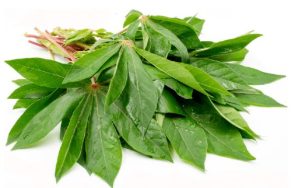Cassava leaves are an important and nutritious vegetable that can be consumed in various ways. Here are some key points about the importance of cassava leaves:

1. **Nutritional Value**: Cassava leaves are rich in essential vitamins and minerals, including vitamin A, vitamin C, iron, and magnesium. They are a good source of protein and dietary fiber, a healthy addition to the diet.
2. **Protein Content**: While not as protein-dense as other vegetables, cassava leaves still provide a moderate amount of protein, which is beneficial for those on plant-based diets or for individuals with specific dietary needs.
3. **Antioxidant Properties**: Cassava leaves contain antioxidants that help protect the body from oxidative stress and reduce the risk of chronic diseases such as heart disease and cancer.
4. **Low Calorie and Fat**: Cassava leaves are low in calories and fat, making them an excellent choice for those looking to manage their weight or reduce their fat intake.
5. **Versatility in Cooking**: Cassava leaves can be prepared in various ways, including stir-frying, sautéing, and boiling. They can be used in salads, soups, and as a side dish, making them a versatile ingredient in the kitchen.
6. **Cultural Significance**: In many cultures, cassava leaves are a traditional and important part of the diet. They are often used in local cuisines and are a staple in many communities, particularly in tropical regions.
7. **Sustainability**: Cassava is a resilient crop that can grow in poor soil conditions and requires less water compared to other crops. This makes it a sustainable option for agriculture, especially in areas with limited resources.
8. **Economic Value**: In some regions, cassava leaves are harvested and sold as a vegetable, providing an additional source of income for farmers. This can help support local economies and reduce food waste.
Overall, cassava leaves are a nutritious and versatile vegetable that offers numerous health benefits and can contribute to a balanced diet.
